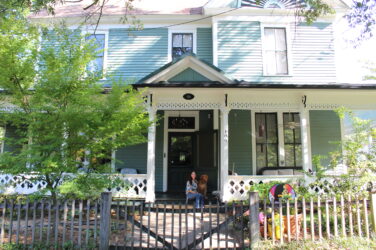By Savannah McCoy
Inside the classrooms and offices at the University of Georgia, professors and administrators run the academic functions of one of the oldest public institutions in America. Although the university’s primary goal is to educate, it provides several other services that professors have little part in.
Next time one grabs a burger from a dining hall, gets on a bus, checks out a book from the library, or works out at Ramsey, they should take a close look at the faces of the employees. Chances are most of the faces are students.
According to the University of Georgia Career Center approximately two thousand students work in four departments- food services, housing, the Ramsay recreational center and the university libraries. The Career Center says this makes up half of the number of university student employees.
While most of these student-held jobs do not affect academic performance, they do simplify student life on campus.
Lorette Edwards’s job as a resident advisor in Soule Hall requires her to be constantly available. Even when she’s not actively on duty to answer emergency calls, she makes herself available to the 40 women she resides over.
“We’re here for the safety of our residents. We’re someone they can talk to. We’re the first step for them finding help. If they’re feeling depressed, we know exactly what resources to bring them to. If they’re having a problem with their roommate, we’ve been trained to help them deal with those issues,” Edwards said.
For many residents, approaching a peer about these problems is more comfortable than approaching someone in their forties or fifties. Because resident advisors are integrated into the community, they are more able to help students adjust and integrate themselves into a collegiate community.
In a 2017 study by Andrew Blumenthal called “Analyzing the Role of the Resident Assistant in Academic Support” students who lived in resident halls were found to have greater academic success and were more involved in campus activities than their non-resident peers. The study showed that resident advisors, by making themselves available to tutor and to listen to student concerns, were able to help these students confront academic problems and problem solve their social issues.
University of Georgia Housing reports that it hired approximately 300 student employees, while hiring only 250 full-time staff. It is one of multiple departments at the university which hire more students than full time employees.
Campus Transit also hires more students than full time employees.
Emilie Gille, a junior public relations major, is one of nearly 195 student bus drivers, confirmed by Campus Transit. In comparison, Transit has hired 35 full time drivers. The number of student bus drivers has nearly doubled since a 2010 report from University transit, which stated approximately 100 student drivers worked for the university. The university hired 20 full time drivers in 2010.
Gille believed that Transit could not succeed without its stable of student employees. She said the campus-centered transportation is best fulfilled by students who are on campus nearly every day, not individuals in the community who rarely otherwise come in contact with the University of Georgia campus. It’s easier to acclimate hundreds of students to campus driving routes than to find the same number of non-students willing to learn the routes.
The UGA campus spans 767 acres. Including weekend and night routes, transit runs 16 bus routes with 51 buses.
The size of the campus and the increased reliance on transit to reach classes at distant parts of the campus has necessitated the dramatic increase in the number of student drivers.
“Personally as a student, I use buses on a daily basis, aside from driving. I mean I don’t know how you would get from class to class in a span of fifteen minutes without the buses. Our campus is so big, I believe the buses are absolutely essential,” Gille said.
Whether it’s in the dorms or on the buses, student employees provide a valuable service to the University of Georgia.





